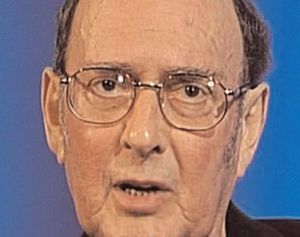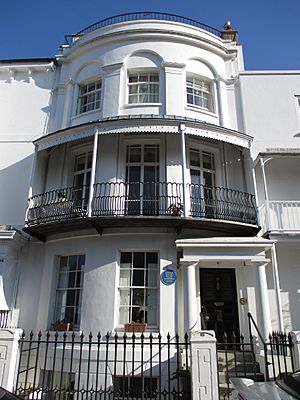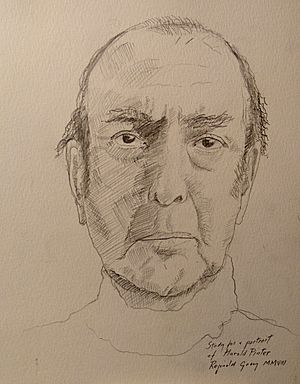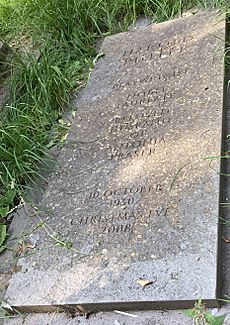Harold Pinter facts for kids
Quick facts for kids
Harold Pinter
|
|
|---|---|

Pinter in 2005
|
|
| Born | 10 October 1930 London, England, U.K. |
| Died | 24 December 2008 (aged 78) London, England, U.K. |
| Occupation | Playwright, screenwriter, actor, theatre director, poet |
| Period | 1947–2008 |
| Notable awards |
|
| Spouse | |
| Children | 1 |
| Signature | |
|
|
|
Harold Pinter (born October 10, 1930 – died December 24, 2008) was a famous British playwright, screenwriter, director, and actor. He won the Nobel Prize in Literature. Pinter was one of the most important British playwrights of his time, and his career lasted over 50 years.
Some of his most famous plays include The Birthday Party (1957), The Homecoming (1964), and Betrayal (1978). He also wrote screenplays for movies like The Servant (1963) and The French Lieutenant's Woman (1981). Pinter also directed or acted in many plays, radio shows, TV shows, and films.
Pinter grew up in Hackney, east London. He enjoyed sports like sprinting and cricket. He also loved acting in school plays and writing poetry. He studied acting but didn't finish his courses. He was fined for refusing to join the army because he was a conscientious objector (someone who refuses to fight in wars for moral reasons).
His first play, The Room, was performed in 1957. Critics sometimes called his early plays "comedy of menace" because they started normally but then became strange and threatening. Later plays, like No Man's Land (1975), were called "memory plays" because they explored how people remember things. Pinter received over 50 awards, including the Nobel Prize in Literature in 2005. He passed away on December 24, 2008, at the age of 78.
Contents
About Harold Pinter's Life
Growing Up and School
Harold Pinter was born on October 10, 1930, in Hackney, east London. He was the only child of Jewish parents. His father, Hyman Pinter, was a tailor, and his mother, Frances, was a housewife.
During World War II, when London was bombed, Pinter was sent away to the countryside for safety. These experiences made him remember feelings of loneliness and loss, which later appeared in his plays.
Pinter went to Hackney Downs School from 1944 to 1948. He was very good at English and enjoyed acting in school plays. His English teacher, Joseph Brearley, was a big influence on him. Pinter played lead roles like Romeo and Macbeth in school productions. He also started writing poetry when he was 12.
Sports and Friends
Pinter was a fast runner and even broke his school's sprinting record. He loved cricket and played it often. He was so keen on cricket that he took his bat with him when he was evacuated during the war. He even had a painting of himself playing cricket in his study!
Pinter also valued his friendships from school. These friends remained important to him throughout his life.
Early Acting Career
In 1948, Pinter started studying at the Royal Academy of Dramatic Art, but he didn't like it and left. He was called to join the army but refused because he was a conscientious objector. He was fined twice for this.
He continued his acting training and worked in different theatre groups in Ireland and England. From 1954 to 1959, he used the stage name David Baron. He played many different roles during this time. To earn extra money, he worked as a waiter, postman, and bouncer.
Family Life

In 1956, Pinter married actress Vivien Merchant. They had a son named Daniel in 1958. Vivien Merchant acted in many of Pinter's plays and films. Their marriage ended in 1980.
In 1980, Pinter married author Lady Antonia Fraser. He was happy in his second marriage and enjoyed spending time with his stepchildren and step-grandchildren.
Harold Pinter's Public Work
Speaking Out on Important Issues
From a young age, Pinter was interested in politics and human rights. In 1948, he refused to join the army because he was against war. He later became a member of the Campaign for Nuclear Disarmament, which worked to get rid of nuclear weapons. He also supported the Anti-Apartheid Movement, which fought against racial segregation in South Africa.
In his later years, Pinter spoke out more and more about political issues. He traveled to Turkey to investigate and protest against the torture of writers. This experience inspired his 1988 play Mountain Language. He also strongly opposed the wars in Iraq and Afghanistan. He believed that countries should follow international law.
Pinter was known for being direct and outspoken. He received the Nobel Prize in Literature, which brought more attention to his political views. He continued to campaign for peace and justice until the end of his life.
Pinter's Creative Work
As an Actor
Pinter acted for over 50 years. He often played villains but took on many different kinds of roles in plays, radio shows, films, and TV. He appeared in films based on his own screenplays, like The Servant (1963).
Some of his notable film roles included a lawyer in Rogue Male (1976) and Sir Thomas Bertram in Mansfield Park (1998). He also acted in TV films like Wit (2001) and Catastrophe (2001).
As a Director
Pinter started directing plays more often in the 1970s. He directed almost 50 productions for the stage, film, and television. This included plays by other writers, such as Simon Gray and Noël Coward. He also directed his own plays.
As a Playwright
Pinter wrote 29 plays and 15 short dramatic pieces. He is considered one of the most important British playwrights of modern times. His unique writing style led to the word "Pinteresque" being used to describe plays that have a similar mysterious or threatening feeling, even though Pinter himself didn't like the term.
Early Plays: "Comedies of Menace"
Pinter's first play, The Room, was written in just three days in 1957. His second play, The Birthday Party (1958), was not successful at first. However, a famous critic, Harold Hobson, wrote a very positive review, which helped Pinter's career.
Critics often called Pinter's early plays "comedies of menace." These plays start in a normal way, but then things become strange, threatening, and sometimes funny. Pinter was influenced by another famous playwright, Samuel Beckett.
His play The Caretaker (1960) made him famous in the theatre world. It ran for a long time and won an award. His plays for radio and TV, like A Night Out (1960), also became very popular.
Plays About Memory
From the late 1960s to the early 1980s, Pinter wrote plays that explored how people remember things. These are sometimes called his "memory plays." They include Landscape (1968), Old Times (1971), and Betrayal (1978). These plays often show how tricky and unclear memories can be.
Plays About Politics
After a short break from writing, Pinter's plays became shorter and more directly political in the 1980s. These plays often criticized oppression, torture, and other human rights abuses. For example, One for the Road (1984) is about the abuse of power.
His play Mountain Language (1988) was inspired by the Turkish government's suppression of the Kurdish language. His last stage play, Celebration (2000), was a satire about wealthy people in London. Even though it was funny, it still showed how powerful people can be cruel.
As a Screenwriter
Pinter wrote 27 screenplays for movies and TV. Many of these were filmed. He became well-known for his screenplays for films directed by Joseph Losey, such as The Servant (1963) and The Go-Between (1971).
He also adapted his own plays into screenplays, like The Caretaker (1963) and Betrayal (1983). Pinter also turned novels by other writers into screenplays, including The French Lieutenant's Woman (1981) and The Trial (1993). His screenplays for The French Lieutenant's Woman and Betrayal were nominated for Academy Awards.
Later Years and Legacy
In 2001, Pinter was diagnosed with cancer. Even though he was unwell, he continued to act and direct. He also became more involved in political activism, writing poems and speeches about important global issues.
In 2005, Pinter announced that he had stopped writing plays to focus more on his political work and poetry. Later that year, he won the 2005 Nobel Prize in Literature.
In October 2006, Pinter performed in a play called Krapp's Last Tape at the Royal Court Theatre. Tickets sold out very quickly, and critics praised his performance. He passed away on December 24, 2008, at the age of 78.
Funeral and Tributes
Harold Pinter's funeral was a private ceremony on December 31, 2008. Many famous theatre people attended. His wife, Antonia Fraser, read a line from Hamlet's play: "Goodnight, sweet prince, / And flights of angels sing thee to thy rest."
After his death, theatre lights on Broadway and in London's West End were dimmed to honor him. In 2009, a room at the Hackney Empire theatre was named after him, and a writing award, the PEN Pinter Prize, was created in his honor.
The Harold Pinter Theatre
In 2011, a theatre in London called the Comedy Theatre was renamed The Harold Pinter Theatre. This was a way to honor his important contributions to British theatre.
Awards and Honors
Pinter received many awards throughout his life. He was made a CBE in 1966 and a Companion of Honour in 2002. He had previously turned down a knighthood.
In 1995, he received the David Cohen Prize for his lifetime achievements in literature. He also won a Laurence Olivier Special Award in 1996 for his work in theatre.
Nobel Prize in Literature
In 2005, Harold Pinter was awarded the Nobel Prize in Literature. This is one of the highest honors a writer can receive. The Swedish Academy praised his plays for uncovering "the precipice under everyday prattle and forces his way into oppression's closed rooms."
Légion d'honneur
In 2007, Pinter received France's highest civilian honor, the Légion d'honneur. The French Prime Minister praised Pinter's writing for showing the "violence and cruelty" of war and imperialism. Pinter, in turn, praised France for opposing the war in Iraq.
Images for kids
See also
 In Spanish: Harold Pinter para niños
In Spanish: Harold Pinter para niños



